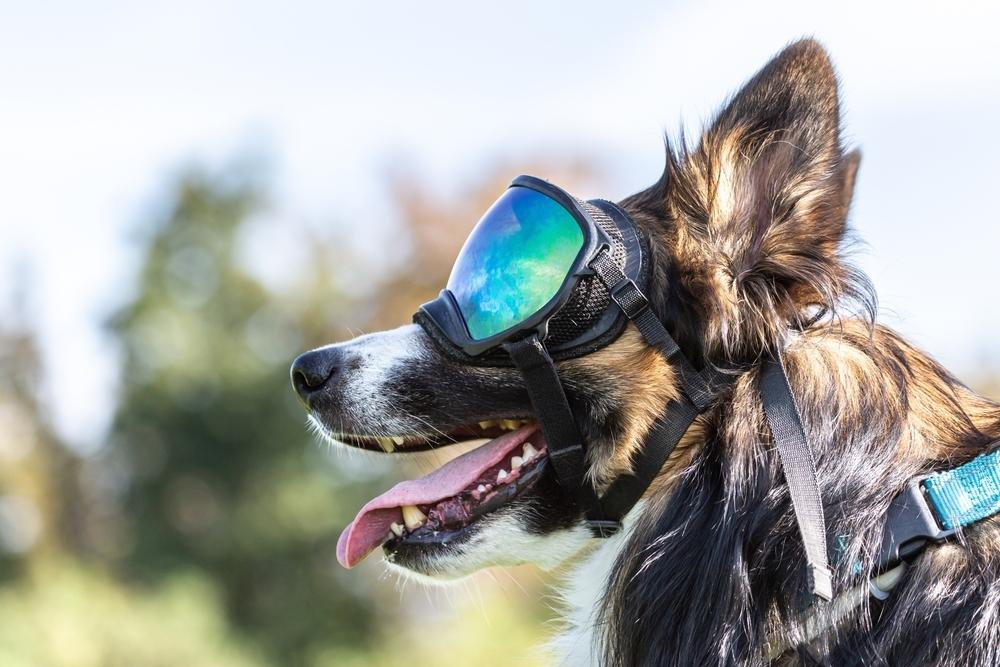

You rely on sunglasses to protect your eyes from harmful ultraviolet (UV) rays, which can lead tocataracts, macular degeneration and other eye conditions. But wait — from daily walks to romps at the dog park, your pup likely gets as much sun exposure as you do. So, do dogs need sunglasses, too?
It's a fair question, and any loving pet parent might wonder how to protect dogs' eyes from sun exposure. However, dogs' eyes have a different relationship to UV rays. Read on for the scoop.
What Should You Know About Eye Health in Dogs?
Your dog counts on their eyes to see, which provides important sensory information about their world and aids in training. In addition to vision, eye comfort is important to your pup's overall well-being. Many eye diseases and injuries may lead to discomfort and vision impairment or loss.
Getting your dog's eyes checked regularly by a veterinarian is the best way to detect subtle changes and treat them before they worsen.

Do Dogs Need Sunglasses?
As fun as it would be to see dogs walking around in all styles of shades, dog sunglasses aren't necessary in most cases. Simply put, dogs don't live long enough to sustain the amount of cumulative UV exposure that would ultimately cause damage.
When Dog Sunglasses Might Benefit Your Pup
While dogs generally don't need sunglasses, they can be helpful in some situations.
Protection From Sunlight
Veterinarians may recommend that dogs with chronic superficial keratitis, or pannus, wear UV protective eyewear since sun exposure can worsen this corneal condition. Vets typically recommend keeping dogs with pannus indoors as much as possible, particularly during peak sunlight hours. Certain breeds, like German shepherds and border collies, are predisposed to this condition, but it can affect any breed.
Other eye conditions, such as iris atrophy, can increase dogs' sensitivity to bright light. If your dog has an underlying eye condition, your vet can advise you on how to best support their eye health and keep them comfortable. In some cases, this may include sunglasses.
Protection From Debris
UV exposure aside, dog sunglasses can also protect your dog's eyes from harmful debris that may cause corneal ulcers, abrasions, cuts or other injuries. For example, brachycephalic breeds like pugs and shih tzus, who have "buggy" eyes and flat faces, are predisposed to brachycephalic ocular syndrome. The shape of these breeds' eyes can increase exposure to the outside world, putting them at higher risk of eye issues and certain diseases, such as dry eye.
Active dogs who enjoy playing on the beach or hiking may also benefit from a little added protection!
Sunglasses for Dogs With Cataracts
Dogs with cataracts or other eye conditions that cause blindness may benefit from goggles or other forms of eye protection. Their vision loss puts them at higher risk of bumping into things and subsequently injuring their eyes. However, this benefit may be more theoretical. Sunglasses for dogs with cataracts aren't typically well tolerated, and they may cause more distress than the amount of protection is worth.
How Can You Protect Dogs' Eyes From Sun Exposure?
If you want to try sunglasses on your dog before your next beach trip or if your veterinarian recommends them, go for it! But don't just put your favorite pair on their face. Dog sunglasses aren't your typical human pair — they're designed to contour to dogs' face shapes. So, if you're looking for eyewear for your favorite furry friend, browse options specially formulated for dogs.
Thinking about buying a pair of sunglasses for your dog? Here's what to keep in mind.

Find the Right Size for Your Dog's Face
Sunglasses for dogs come in all shapes and sizes. They're designed to fit the full range of dog breeds, from 3 pounds to 200 pounds. Take your dog's measurements if you're buying them online, or bring your dog to a store to try them on. Dog faces vary widely in shape, and finding the right fit is important for comfort and function.
Look for a Pair With an Eyewear Retainer
To ensure your pup's new eyewear stays snugly on their face (no matter how much they wag or wiggle), look for sunglasses with an eyewear retainer or dog goggles with UV protection. Goggles tend to be more popular and well tolerated.
Practice Patience
Acclimating your dog to their new accessory will take time and training, especially if they're older. Some dogs just won't tolerate sunglasses, no matter how hard you try. Take things slow. Let them try on the new shades for a few moments at a time, then remove them and offer a fun treat or toy as a reward. Continue this training regularly, gradually increasing the time you leave the glasses on until they're ready to take their shades into the great outdoors.
If your dog paws at their face or rubs it on the ground while wearing sunglasses, stop use to prevent injury and consult your vet for advice.
Do dogs need sunglasses? In general, no. But they can be helpful — and, at the very least, they're certainly fun. Whether you want to protect your dog's eyes from the sand or be the talk of the dog park, dog sunglasses can be a great option as long as your pup likes to wear them. If you have any questions about eye protection options or concerns about your dog's eyes, talk to your veterinarian. They can help assess your dog's eye health and recommend how to keep them healthy.




















